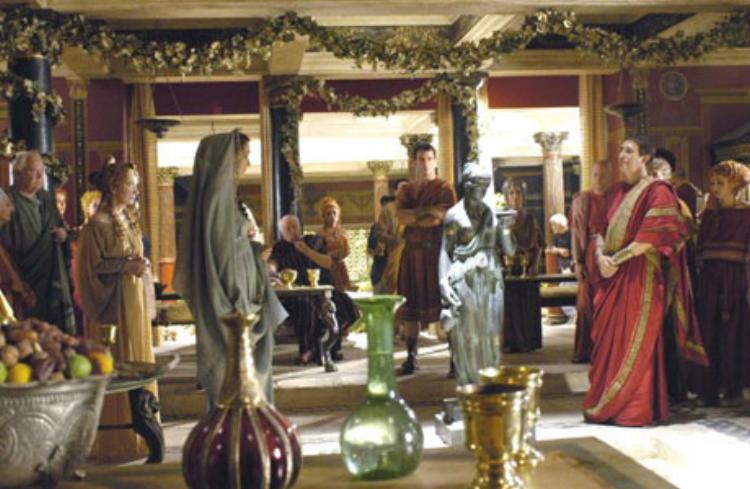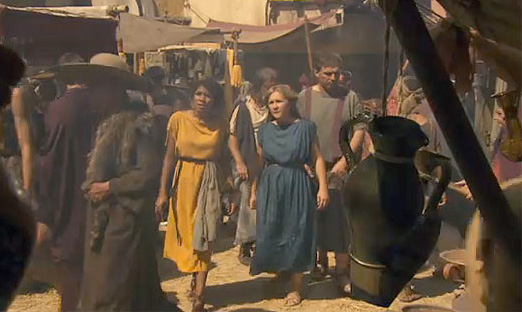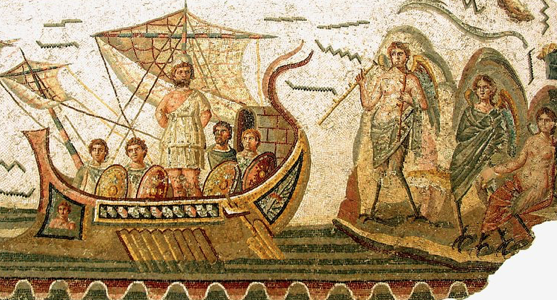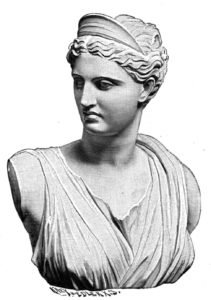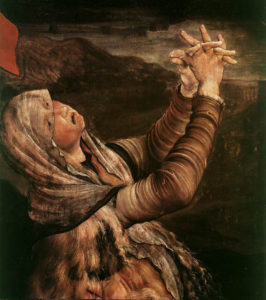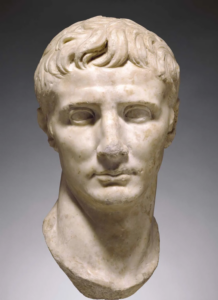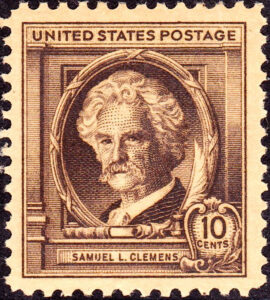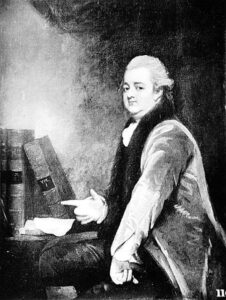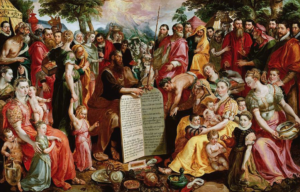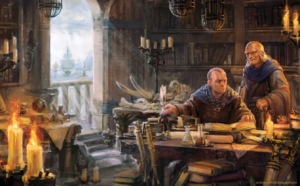The communism of antiquity, 5
by Alain de Benoist
Christian doctrine was a social revolution. It did not affirm for the first time that the soul existed (which would not have made it original), but that everyone had one identical at birth. The men of ancient culture, who were born into a religion because they were born into a fatherland, tended instead to think that by adopting a behaviour characterised by rigour and self-control they might succeed in forging a soul, but that this was a fate reserved undoubtedly for the best. The idea that all men could be gratified with it indifferently and simply by the fact of existing was shocking to them. On the contrary, Christianity maintained that everyone was born with a soul, which was equivalent to saying that men were born equal before God.
On the other hand, in its rejection of the world, Christianity presented itself as the heir of an old biblical tradition of hatred of the powerful, of the systematic exaltation of the ‘humble and the poor’ (anavim ébionim), whose triumph and revenge over wicked and proud civilizations had been announced by prophets and psalmists. In the Book of Enoch, widely disseminated in the first century in Christian circles (cited in the epistles of Jude XV, 4, and of Barnabas: XV), we read: ‘The Son of Man will raise kings and the powerful from their beds and the strong from their seats; he will break their strength… He will overthrow kings from their thrones and their power. He will make the mighty turn their faces away, and cover them with shame…’ (Enoch XLVI, 4-6).
Jeremiah takes pleasure in imagining the future victims in the form of animals for the slaughter: ‘Separate them, O Yahweh, like sheep for the slaughter, and reserve them for the day of slaughter’ (Jeremiah XII, 3). To the women of the powerful, whom he calls ‘cows of Bashan’ (Amos IV, I), Amos predicts: ‘Yahweh has sworn by his holiness: The days will come upon you when you will be lifted with hooks, and your descendants with fishing spears’ (IV, 2). The psalms outline the beginning of the class struggle, and the same spirit will inspire ‘the first groups of Christians and later the monastic orders’ (A. Causse, op. cit.). ‘In the end, there is only one theme in the Psalms,’ says Isidore Loeb, ‘which is the struggle of the poor against the wicked, and his final triumph thanks to the protection of God, who loves the one and hates the other’ (Littérature des pauvres dans la Bible).
The poor are always the victims of injustice. They are called the Humble, the Holy, the Just and the Pious. They are unfortunate, prey to all evils; they are sick, invalid, alone, abandoned, relegated to a valley of tears, they water their bread with tears, etc. But they bear their pain; they even seek it out because they know that such trials are necessary for their salvation, that the more they are humiliated, the more they will triumph, the more they suffer, the more they will one day see others suffer. As for the wicked, they are rich, and their wealth is always culpable.
 They are happy, build cities, perform pre-eminent social functions, and command armies, but they will one day be punished in proportion as they dominate. ‘Such is the social ideal of Jewish prophecy,’ says Gerard Walter, ‘a kind of general levelling which will make all class distinctions disappear and lead to the creation of a uniform society from which all privileges of any kind will be banished. This egalitarian sentiment, carried to its ultimate limits, is linked to an irreducible animosity against the rich and the powerful, who will not be admitted into the future kingdom. The ideal humanity of the announced times will include all the just without distinction of creed or nationality’ (Les origines du communisme, Payot, 1931).
They are happy, build cities, perform pre-eminent social functions, and command armies, but they will one day be punished in proportion as they dominate. ‘Such is the social ideal of Jewish prophecy,’ says Gerard Walter, ‘a kind of general levelling which will make all class distinctions disappear and lead to the creation of a uniform society from which all privileges of any kind will be banished. This egalitarian sentiment, carried to its ultimate limits, is linked to an irreducible animosity against the rich and the powerful, who will not be admitted into the future kingdom. The ideal humanity of the announced times will include all the just without distinction of creed or nationality’ (Les origines du communisme, Payot, 1931).
The second book of the Sibylline Oracles paints a picture of humankind regenerating in a new Jerusalem under a strictly communist regime: ‘And the land will be common to all; there will be no more walls or frontiers. All will live in common and wealth will be useless. Then there will be no more poor or rich, no tyrants or slaves, no great or small, no kings or lords, but all will be equal’ (Or. Sib. II, 320-326).
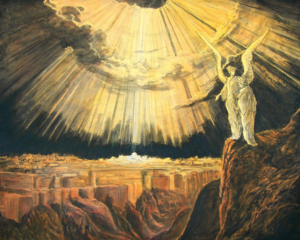 Given this, it is easier to understand why Christianity initially seemed to the ancients to be a religion of slaves and heimatlos, a vehicle for a kind of ‘counterculture’ that only achieved success among the dissatisfied, the declassed, the envious and the revolutionaries avant la lettre: slaves, artisans, fullers, carders, shoemakers, single women, etc. Celsus describes the first Christian communities as ‘a mass of ignorant people and gullible women, recruited from the dregs of the people,’ and his adversaries hardly try to disabuse him on this point. Lactantius preaches equality in social conditions: ‘There is no equity where there is no equality’ (Inst. VII, 2). Under Heliogabalus, Calixtus, bishop of Rome, recommends that converts marry slaves.
Given this, it is easier to understand why Christianity initially seemed to the ancients to be a religion of slaves and heimatlos, a vehicle for a kind of ‘counterculture’ that only achieved success among the dissatisfied, the declassed, the envious and the revolutionaries avant la lettre: slaves, artisans, fullers, carders, shoemakers, single women, etc. Celsus describes the first Christian communities as ‘a mass of ignorant people and gullible women, recruited from the dregs of the people,’ and his adversaries hardly try to disabuse him on this point. Lactantius preaches equality in social conditions: ‘There is no equity where there is no equality’ (Inst. VII, 2). Under Heliogabalus, Calixtus, bishop of Rome, recommends that converts marry slaves.
For this reason, there is no idea more odious to the Christian than that of the fatherland: how can one serve both the land of one’s fathers and the Father who is in heaven? Salvation does not depend on birth, belonging to a city, or the seniority of one’s lineage but exclusively on respect for dogmas. From then on, it is enough to distinguish believers from unbelievers, and all other boundaries must disappear. Paul insists on this: ‘There is neither Jew nor Greek, there is neither male nor female…’ Hermas, who enjoyed great authority in Rome, condemns the converts to perpetual exile: ‘You servants of God live in a foreign land. Your city is very far from this one’ (Sim. I, I).
Such a disposition of spirit explains the Roman reaction. Celsus, a patriot concerned about the health of the State, who sensed the weakening of the Imperium and the decline of civic feeling that the triumph of Christian egalitarianism could provoke, begins his True Discourse with these words: ‘A new race of men born yesterday, without homeland or traditions, united against all religious and civil institutions, persecuted by justice, accused of infamy by all and who glory in this common execration: that is what Christians are. Factious men who pretend to make a separate ranch and separate themselves from common society.’ And Tacitus, who says that they were detested for their ‘abominations’ (flagitia), accuses them of the crime of ‘hatred of the human race.’ ‘As soon as it was suppressed,’ he says, ‘this execrable superstition was once again breaking out not only in Judea, the cradle of the plague, but in Rome itself, where all the horrors and infamies that exist flow from all sides and are believed…’
The imperial principle is at this time the instrument of a conception of the world carried out as a vast project. Thanks to it, the Pax Romana reigns in an ordered world. Filled with admiration, Horace exclaims: ‘The ox wanders safely through the fields fertile by Ceres and Abundance, while sailors everywhere plogh the peaceful seas.’ In Halicarnassus, a tripartite inscription in honour of Augustus proclaims: ‘Cities flourish amid order, concord and wealth.’ But for the early Christians the pagan State is the work of Satan. The Empire, the supreme symbol of a proud force, is nothing but arrogance worthy of ridicule. The harmonious Roman society is declared without exception guilty, for its resistance to monotheistic demands, traditions and way of life, are so many offences against the laws of heavenly socialism. And as guilty, it must be punished; that is, destroyed. Like a lengthy complaint, the Christian literature of the first two centuries breathes out its rosary of anathemas. With feverish impatience the apostles preach the ‘hour of vengeance,’ ‘so that all things which are written may be fulfilled’ (Luke XXI, 22). As the Fathers of the Church did after them, they announce the imminence of revenge, of the ‘great night’ when everything will be turned upside down. The Epistle of James contains a call to class struggle: ‘Come now, you rich people! Weep and howl for the misery that will come upon you. Your riches are corrupted and your clothes are moth-eaten’ (V,1-2).
James, who has read the Book of Enoch, predicts terrible tortures for the rich and the pagans. He imagines the final judgment as a ‘knock to the throat,’ ‘a kind of immense slaughterhouse to which thousands of the well-off, fat and splendid, and with all their wealth on them, will be dragged. He is joy at seeing them go one by one, returning their ill-gotten gains before feeding with their fat the formidable carnage he glimpses in his dreams’ (Gérard Walter, op. cit.). Above all, he accuses the rich of deicide: ‘You condemned and killed the Just One.’ (V, 6.) This thesis, which makes Jesus the victim, not of a people, but of a class, will soon become popular. Tertullian writes: ‘The time is ripe for Rome to end up in flames. She will receive the reward her works deserve’ (On Prayer, 5).
The Book of Daniel, written between 167 and 165 b.c.e., and the Book of Revelation are the two great sources from which this holy fury draws. St. Hippolytus (c. 170-235), in his Commentary on Daniel, places the end of Rome around the year 500 and attributes it to the rise of democracies: ‘The toes of the statue in Nebuchadnezzar’s dream represent the coming democracies, which will separate from each other like the ten toes of the statue, in which iron will be mixed with clay.’ Around 407, St. Jerome, in another Commentary on Daniel, defines the end of the world as ‘the time when the kingdom of the Romans will be destroyed.’ Other authors repeat these prophecies: Eusebius, Apollinaris and Methodius of Olympus. The revolutionary ardour against Rome, the ‘accursed city,’ ‘new Babylon,’ and ‘great harlot’ knows no bounds. The city is the last avatar of Leviathan and Behemoth.
In all these apocalypses, sibylline mysteries and double-meaning prophecies, in all this mental trepidation, hypersensitive to ‘symbols’ and ‘signs,’ in all this psalm-like literature, we find more imprecations than would have been necessary to warm the spirits, shake the imaginations and even arm still hesitant hands. This explains the accusations that followed the burning of Rome in the year 64.
Deuteronomy ordered the services of God to slaughter unbelieving populations and burn their cities in honour of Yahweh, and Jesus repeated the image: ‘He who does not abide in me will be thrown out like a branch that withers, and is gathered and thrown into the fire and is burned’ (John XV, 6). And indeed, from Rome to the bonfires of the Inquisition, much will burn. Sacred pyromania will be exercised without respite. ‘This idea (that the world of the impious will be destroyed by fire),’ says Bouché-Leclercq, ‘had been received by Christians from Jewish seers, from those prophets and sibilants who invoked lightning as quickly as a torch, iron as quickly as fire on the cities and peoples hostile to Israel. Never has the imagination burned so much as in the prophecies of Isaiah and Ezekiel, the richest collection of anathemas that religious literature has ever produced.’
‘In this opinion of a general fire,’ adds Gibbon, ‘the faith of Christians came to coincide with the Eastern tradition… The Christian, who based his belief not so much on the fallacious arguments of reason as on the authority of tradition and the interpretation of Scripture, awaited the event with terror and confidence, was sure of its ineluctable imminence. As this solemn idea permanently occupied his mind, he regarded all the disasters that befell the Empire as so many infallible symptoms of the agony of the world.
